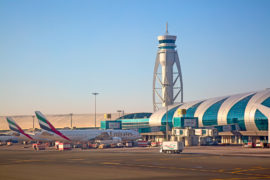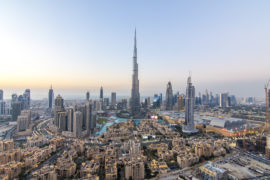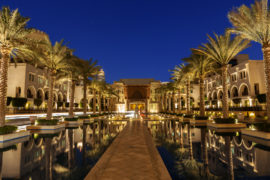Destination wedding tourism is helping to define the region’s hospitality industry landscape, along with female-led and solo travel, adventure, agritourism and wellness, according to data revealed ahead of Arabian Travel Market 2020.
Research from Colliers International, the official research partner of Arabian Travel Market, suggests that the destination wedding segment is now worth over $90bn worldwide, with a quarter of all marriages taking place overseas.
This means that there are around 340,000 destination weddings taking place on an annual basis.
The regional market in the Middle East is worth more than $4.5bn, accounting for 5% of the destination weddings market in the entire world.
The most favoured location within the region is the United Arab Emirates because of its constant sunshine, numerous pristine beaches, attractive mountain ranges, easy connectivity and relaxed regulations for visas.
Arabian Travel Market’s exhibition director in the Middle East Danielle Curtis says that destination wedding tourism is one of the four biggest trends that the Colliers report identified as defining the region and the worldwide tourism market in the future.
Overseas weddings are starting to play an important part in the growth of the hospitality industry all over the world, with couples looking to find personalised and one-of-a-kind experiences in other countries.
These weddings then make a positive impact on local economies, according to Curtis.
Another notable trend to emerge is eco-tourism, wellness, adventure and agritourism (EWAA), which is particularly popular with consumers who are environmentally conscious.
70% of world travellers are more likely to book eco-friendly accommodation, with 52% willing to change their holiday behaviour for the sake of sustainability, according to the data.
The travellers of today’s world are more knowledgeable about tourism’s environmental impact and are seeking destinations that offer sustainable accommodation and experiences such as glamping.
Glamping is a modern variant of camping that mixes more luxurious amenities and facilities with the more traditional aspects.
The popularity of glamping has grown considerably in the Middle East in recent years, primarily because of the varied landscapes within the region.
There are a number of glamping sites opening in the UAE, Jordan and Oman, including the likes of Hatta Sedr Lodges in Hatta, Desert Nights Camp in Oman, Bedouin Oasis Camp in Ras Al Khaimah and Wadi Rum Night Luxury Camp in Jordan.
An increase in the number of female and solo travellers is also being predicted, with solo travel worldwide searches having risen by 17.4% last year in comparison to 2017.
Travelling alone has become a more socially acceptable idea, and single supplement fees have been removed by tour operators and hotels to support this expanding market.
58% of millennials are likely to travel solo, in comparison to just 47% of the baby boomer generation, with 74% of solo travellers being women.
Social media sites such as Pinterest and Instagram are the main inspiration sources for such unaccompanied travel journeys.
Anyone interested in travelling to the UAE or Middle East for any reason should take out travel insurance.
Travel insurance ensures that unexpected occurrences such as cancelled flights or stolen valuables do not leave travellers seriously financially disadvantaged.




